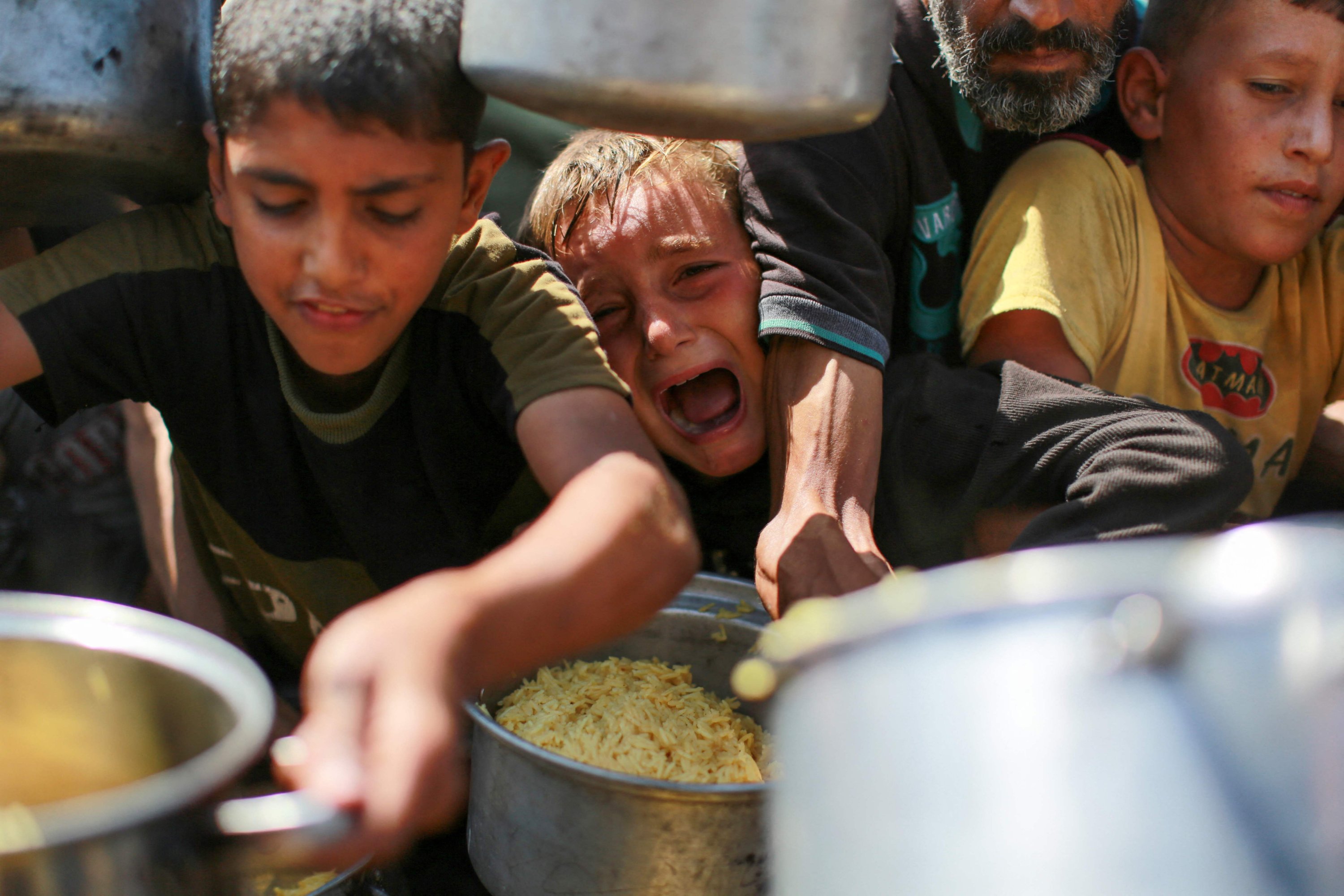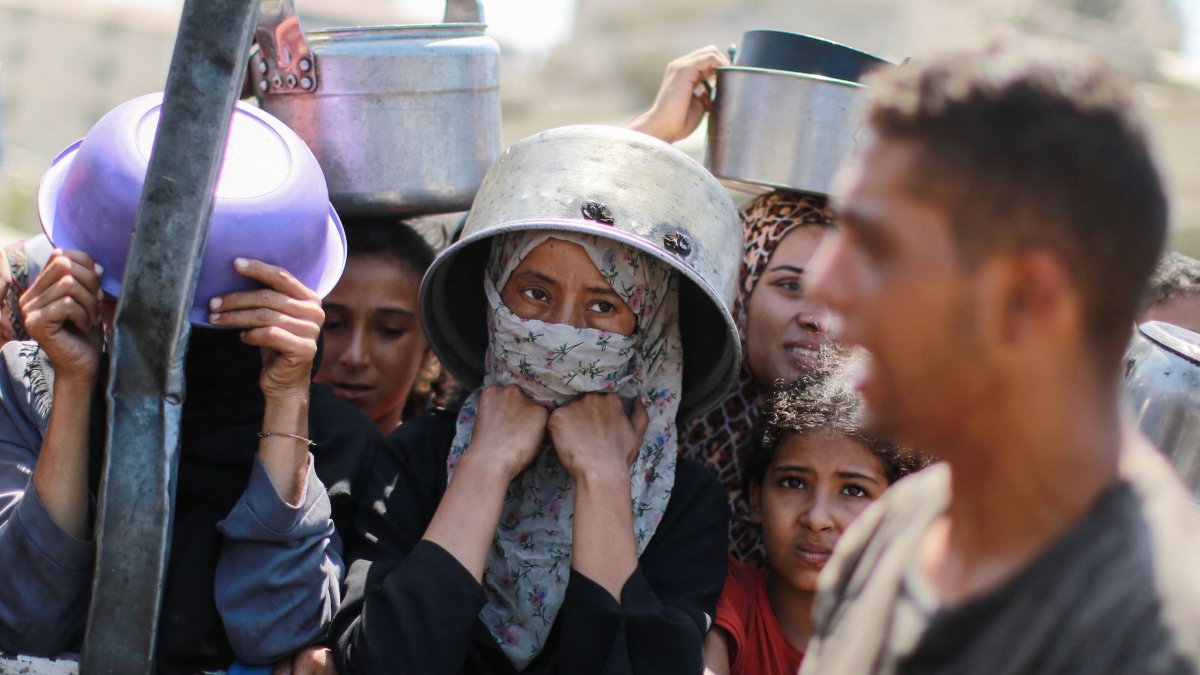Starvation is sweeping across Gaza, the head of the United Nations World Food Programme said Thursday, as nearly a quarter of the territory’s population faces famine and urgent international pressure mounts on Israel to allow greater humanitarian access.
Cindy McCain, WFP executive director, returned from a tour of Gaza this week deeply shaken by what she witnessed.
“I personally met mothers and children who were starving in Gaza. It is real and it is happening now,” she told The Associated Press (AP).
McCain said entire families, displaced from the northern districts, are living in tents with barely enough food to survive. “I got to meet a family of 11 who had literally not had enough food at all,” she said.
Her observations come amid the declaration by the Integrated Food Security Phase Classification (IPC) that famine has taken hold in Gaza City, affecting roughly 514,000 people.

People try to get rice from a charity kitchen providing food for free, Gaza City, Palestine, Aug. 28, 2025. (AFP Photo)
Without a cease-fire and unimpeded access for humanitarian aid, the famine could spread to central and southern districts, including Deir al-Balah and Khan Younis, by the end of September, the IPC warned.
McCain met with Israeli Prime Minister Benjamin Netanyahu in Jerusalem, pressing for increased aid access and secure routes for convoys.
Netanyahu was “obviously very concerned that people aren’t getting enough food,” McCain said. Both agreed to “redouble efforts to expedite and sustain the entry of humanitarian goods into Gaza,” but Israel continues to reject claims of famine as propaganda favoring Hamas.
Insufficient aid
Aid delivery remains insufficient.
Currently, about 100 WFP trucks enter Gaza daily, compared to 600 trucks during a previous two-month cease-fire that ended in mid-March.
Israel’s COGAT agency, which oversees humanitarian transfers, said more than 300 trucks enter Gaza each day, most carrying food.
Yet decades of conflict, the blockade earlier this year, and the near-collapse of Gaza’s food production have left aid far short of need.
The United Nations secretary-general, Antonio Guterres, called Gaza’s situation “a present-day catastrophe,” warning that ongoing Israeli military operations could force hundreds of thousands of already traumatized civilians to flee once again.
“Gaza is piled with rubble, piled with bodies, and piled with examples of what may be serious violations of international law,” he said.
The humanitarian crisis has intensified as Tel Aviv presses military operations in response to Hamas’ Oct. 7, 2023, incursion into southern Israel, which killed roughly 1,200 people and led to the abduction of 251 hostages.
Although most hostages have been released through cease-fires or negotiated deals, about 50 remain in Gaza.
Egypt and Qatar have proposed a 60-day cease-fire to Israel, which Hamas has accepted.
The plan includes the release of 10 living hostages, the handover of 18 bodies and a partial Israeli withdrawal to a buffer zone. Israel has yet to respond.
Meanwhile, Israeli airstrikes hit Sanaa, Yemen’s capital, in retaliation for attacks by Iran-backed Houthi rebels, who have launched missiles and drones toward Israel and Red Sea shipping over the past 22 months, citing solidarity with Palestinians.
The Palestinian Health Ministry, part of Gaza’s Hamas-run government and staffed by medical professionals, reported that nearly 63,000 people have died since the war began.
Over 70 were killed in Israeli strikes in the past day alone and more than half of the dead were women and children.
Israel disputes these figures but has not provided independent data.
McCain emphasized that although more aid is reaching Gaza, it is not nearly enough to prevent widespread starvation.
“We’re moving in the right direction, but it’s not nearly enough to make sure people are not malnourished and not starving,” she said. She described the devastation she witnessed: flattened neighborhoods, clinics struggling to support children and pregnant women, and families trapped in extreme hunger.
The WFP hopes to gain greater access following McCain’s meeting with Lieutenant General Eyal Zamir, chief of staff of the Israeli military. McCain pressed for safe corridors, unfettered convoy movement, and guarantees against delays.
The military said it remains committed to preventing famine and enabling humanitarian aid to reach Gazans.

The Daily Sabah Newsletter
Keep up to date with what’s happening in Turkey,
it’s region and the world.
SIGN ME UP
You can unsubscribe at any time. By signing up you are agreeing to our Terms of Use and Privacy Policy.
This site is protected by reCAPTCHA and the Google Privacy Policy and Terms of Service apply.

